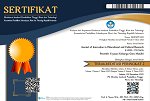TOEFL Score Achievement as a Graduation Requirement in the Vocational Institute: Need Analysis on Maritime Institute
(1) Sekolah Tinggi Ilmu Pelayaran Jakarta, Indonesia
(2) Sekolah Tinggi Ilmu Pelayaran Jakarta, Indonesia
Abstract
The Jakarta Maritime Institute is one of the vocational institutions that has a special requirement for their students to achieve a TOEFL score of >500 in all majors. The TOEFL test is considered normal as a graduation requirement, but in other cases, some students are concerned about the high TOEFL passing score determined by the institution. This study is conducted to analyze whether the TOEFL score with a passing score of 500 needs to be applied to prospective vocational graduates. The data were gathered through questionnaires and interviews from three categories of respondents: level IV students, alumni, and shipping company management as users of fresh graduates from this institution. The result of this study proved that most of the respondents stated the minimum TOEFL test score of 500 was unnecessary for graduation requirements. Therefore, this study concludes that the TOEFL score is considered very difficult for students to achieve. So, the institution, particularly vocational schools, should determine the TOEFL passing grade based on the school’s characteristics.
Keywords
Full Text:
PDFReferences
Aminah., & Refaldi. (2020). Students' Needs on Maritime English Learning Material: A Case at Vocational High School. The 7th International Conference on English Language Teaching, 242-249. Atlantis Press.
Anthony, L. (2018). Introducing English-Specific Purposes. Routledge.
Arslan, M. U., & Akbarov, A. (2012). EFL Learners Perceptions and Attitudes towards English for the Specific Purposes. Acta Didactica Napocensia, 5(4), 25-30.
Astuti, E., & Sudrajat, W. S. (2018). Students’ perceptions of the use of TOEFL preparation online course on the text performance: the case of TOEFL structure and written expression test. Humaniora, 9(3), 275-282.
Basturkmen, H. (2010). Developing Courses in English for Specific Purposes. Palgrave Macmillan London.
Belyaeva. (2015). English for Specific Purposes: Characteristic Features and Curriculum Planning Step. Sustainable Multilingualism, 73-91.
Byram, M., & Hu, A. (2013). Routledge Encyclopedia of Language Teaching and Learning. Routledge.
Dirgeyasa, I. W. (2018). The Need Analysis of Maritime English Learning Materials for Nautical Students of Maritime Academy in Indonesia based on STCW'2010 Curriculum. English Language Teaching, 11(9), 41-47.
Dirgeyasa, I. (2015). The Need Analysis of Maritime Writing Materials through Genre Based Approach for Maritime Education and Training in Indonesia. The 62nd Teflin International Conference. FBS Udayana.
Erfani, S. S. (2014). An Investigation on the Attitudes of IELTS and TOEFL iBT Teachers: A Quantitative and Qualitative Washback Study. British Journal of Education, Society, And Behavioural Science, 88-102.
ETS. (2023). Test Taker: TOEFL Test. Retrieved from TOEFL Test: https://www.ets.org/toefl.html
Khosiyono, B. H., Pardjono, & Priyana, J. (2021). Evaluating English Syllabus for Maritime Vocational School: Towards Redesigning a New Syllabus. MEXTESOL Journal, 45(2).
Ma, J., & Cheng, L. (2015). Chinese Students’ Perceptions of the Value of Test Preparation Courses for the TOEFL iBT: Merit, Worth, and Signi cance. TESL Canada Journal, 33(1), 58-79.
Mahmud, M. (2014). The EFL Student's Problems in Answering the TOEFL Test of English as a Foreign Language (TOEFL): A Study in Indonesian Context. Theory and Practice in Language Studies, 2581-2587.
Muliyah, P., & Aminatun. (2020). Teaching English for specific purposes in vocational high school: teachers' beliefs and practices. Journal of English Teaching, 6(2), 122-133.
Nicolas, E., & Fauziningrum, E. (2018). Need Analysis of Teaching and Learning Maritime English Nautical Class of STIMART "AMNI" Semarang. Journal of English Teaching, 5(2) 1-8.
Noor, S., Tajik, O., & Golzar, J. (2022). Simple random sampling. International Journal of Education & Language Studies, 1(2), 78-82.
Poedjiastutie, D. (2017). The Pedagogical of English for Specific Purposes (ESP) Teaching at the University of Muhammadiyah Malang Indonesia. Educational Research and Review, 338-339.
Raharjo, S. (2020). Students' Perception: Assessing English Competence in TOEFL as a Standardized English Language Proficiency Test in Indonesian's Higher Education. Intensive Journal, 40-48.
Rahma, E., Syafitri, R., Syahputri, V., & Parlindungan, F. (2021). An Evaluation of TOEFL Benchmark Policy as an Exit Requirement for Undergraduate Students. South East Asia Language Teaching and Learning Journal, 18-25.
Samad, I., Jannah, M., & Fitriani, S. (2017). EFL Students' Strategies Dealing with Common Difficulties in the TOEFL Reading Comprehension Section. International Journal of Language Education, 29-36.
Salazar, E. U. (2017). Designing and implementing an ESP course: Revisiting an experience. Pensamiento Actual, 17(28), 197-207.
Septiana, I. (2018). The Challenges of teaching for English specific purposes in higher education. Jurnal Ilmiah Bina Bahasa, 11(1), 22-31.
Sudar. (2018). English Learning Process in the Vocational School Based on the Systematic Functional Linguistic (SFL). 5th Asia-Pacific Education Conference (AECON 2018), 216-224. Atlantis Press.
Sugiyono. (2015). Penelitian Kuantitative, Kualitative, dan R&D. Alfabeta.
Taufiq, W., & Fediyanto, N. (2017). Critical Analysis on TOEFL ITP as a Language Assessment. The 1st International Conference on Intellectuals' Global Responsibility, 226-229.
Wait, I. W., & Gressel, J. W. (2009). Relationship between TOEFL Score and Academic Success for International Engineering Students. Journal of Engineering Education 98 (4), 389-398.
Warfield, W., Laribee, R., & Geyer, R. (2013). Examining Results and Establishing Benchmark Data from the TOEFL ITP Test. Academic and Scholarly Research Journal, 5(3), 191-198.
Widodo, H. (2014). Contextually flaming the design of esp materials: Vocational English reading tasks. UAE: TESOL Arabia , 140-163.
Zhang, Y., & Cole, C. (2018). Maritime English as a Code--tailored ESP: Gemre-based Curriculum Development as a Way Out. Iberica, 145-170.
Zi-hua, D. (2015). The Existing Situation and Training Maritime English Teaching in China. Journal of Shipping and Ocean Engineering. Vol.5, 266-270.
Refbacks
- There are currently no refbacks.
View My Stats

